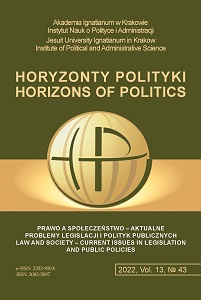Tworzenie regulacji prawnej dotyczącej przedsiębiorstwa społecznego w Polsce w kontekście teorii demokracji deliberatywnej
Legal Regulation Making of Social Enterprise in Poland in the Context of Deliberative Democracy Theory
Author(s): Marta Bohdziewicz-Lulewicz, Dorota Murzyn, Agnieszka PacutSubject(s): Political Sciences, Politics and law, Law on Economics
Published by: Uniwersytet Ignatianum w Krakowie
Keywords: deliberative democracy; civic dialogue; social economy; social enterprise; law on social economy;
Summary/Abstract: RESEARCH OBJECTIVE: The aim of this article is to describe the process of creating a regulation dedicated to social enterprise (SEI) and social economy (SE), to identify the main actors and mechanisms in the context of deliberative democracy theory. THE RESEARCH PROBLEM AND METHODS: The article provides a conceptual and theoretical analysis of the basic assumptions of deliberative democracy, social and civil dialogue and social enterprise. The research was based on desk research, mainly drafts of legal acts in the field of SEI and SE and reports from their consultations. THE PROCESS OF ARGUMENTATION: The paper presents: the concept of social enterprise and the legal framework of the SEI in Europe; the assumptions of deliberative democracy and civic dialogue in the context of citizen participation in law-making process; the process of creating regulation dedicated to the SEI and the SE in Poland together with ongoing debates of the SE community around it. RESEARCH RESULTS: The process of creating a regulation dedicated to SEI and SE is embedded in the concept of deliberative democracy. Various actors were involved, initially linked to the social sector and later also to public sector at various levels. The process used diverse forms of consultation and actor involvement. CONCLUSIONS, INNOVATIONS, AND RECOMMENDATIONS: The analysis identified two models for initiating work on the Law on SEI and SE: the outside initiative model and the mobilisation model. It was found that the lack of legislation may be due to: the lack of a leader coordinating the initiative, low motivation and acceptance of the SE community for the idea of SEI, poor recognition of the concept of SEI in the society and the heterogeneity of the SE community. It was suggested to develop the research in the context of interest group analysis and their impact on the law-making process.
Journal: Horyzonty Polityki
- Issue Year: 13/2022
- Issue No: 43
- Page Range: 51-71
- Page Count: 21
- Language: Polish

